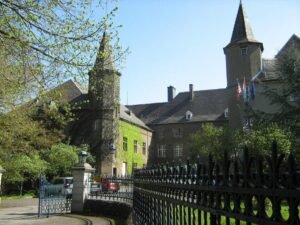Luxembourg, a despite its modest scale, it intriguing nation nestled in the heart of Europe, offers a rich tapestry of history, culture, and wealth. Known for its grand duchy and financial prowess, Luxembourg may be compact in size, but it holds a multitude of surprises for those willing to explore its unique character.
It’s fascinating how such a petite country can boast such a vibrant blend of elements. From its role in global finance to being a hub of cultural convergence, Luxembourg’s allure lies in the details. Each corner of this charming land has stories to tell and secrets to share.
With a monarchy that dates back centuries and a society that embraces modernity with grace, Luxembourg is a place where history meets the present in harmony. Whether you’re drawn to its picturesque landscapes or its bustling city life, there are countless aspects to discover in this captivating duchy.
Here are some intriguing points that highlight what makes Luxembourg an extraordinary place:
- The country is one of the world’s smallest sovereign nations, yet it plays a significant role in international finance.
- Luxembourg City is a UNESCO World Heritage site, known for its fortified medieval old town.
- The nation is trilingual, with French, German, and Luxembourgish as its official languages, reflecting its cultural diversity.
- Despite its size, Luxembourg is home to more Michelin-starred restaurants per capita than any other country.
- The Grand Ducal Palace, a symbol of the monarchy, is an architectural marvel worth visiting.
These are just a few of the many facets that make Luxembourg a truly fascinating destination for travelers and history enthusiasts alike. Whether you’re planning a visit or simply curious, this grand duchy offers more than meets the eye.
Discovering Luxembourg: A Compact Jewel of Europe
Luxembourg might be small, but it is rich in history, culture, and unique characteristics that set it apart from its European neighbors. Here are some intriguing details that reveal what makes this country so distinctive:
Monarchy and Governance
Luxembourg is one of the few remaining grand duchies in the world, with a constitutional monarchy led by the Grand Duke. This unique form of governance plays a significant role in the nation’s identity.
Financial Hub
Despite its size, Luxembourg is a powerhouse in global finance. Known for its wealth, the country hosts numerous banking institutions and financial organizations, making it an essential player in the financial world.
Here are some key points enhancing its financial reputation:
- Ranked consistently among the wealthiest countries globally
- Home to prominent investment funds and private banks
- A hub for European financial operations
Cultural Richness
Luxembourg’s culture is a blend of influences from its neighboring countries, which contributes to its vibrant arts scene and multicultural lifestyle.
Five captivating aspects of Luxembourg’s culture:
- A melting pot of languages: Luxembourgish, French, and German are official languages
- A thriving tradition of music, theatre, and museums
- A rich historical tapestry evident in its architecture and festivals
- A diverse culinary scene featuring local and international cuisines
- Strong preservation of cultural heritage alongside modern innovation
Tourism and Attractions
Luxembourg offers an array of attractions for visitors eager to explore this charming nation. From its picturesque landscapes to historic monuments, there is something for everyone.
Three must-see things in Luxembourg:
- The majestic Vianden Castle, a testament to medieval architecture
- The Old Quarter of Luxembourg City, a UNESCO World Heritage site
- Luxembourg American Cemetery and Memorial, where many soldiers from World War II are honored
These elements make Luxembourg a fascinating destination, combining its rich history with modern-day allure.
Unique Multilingual Society in Luxembourg
Luxembourg, a petite duchy in the heart of Europe, boasts a rich tapestry of languages woven into its culture. This multilingual society is a fascinating blend of history, tradition, and modernity that defines the nation’s identity.
Languages at the Core of Culture
- Luxembourgish is the national language, symbolizing the duchy’s essence.
- French and German, both official languages, play central roles in administration and education.
- English is widely spoken, often used in the finance sector and international business.
Facts to Know
- Education is a multilingual journey; students learn in Luxembourgish, German, and French from a young age.
- Government and legal documents are primarily in French, showcasing its historical roots.
- German media is prevalent, reflecting the influence of the neighboring country.
This harmonious coexistence of languages is not just a practical arrangement but an integral part of Luxembourg’s wealth of cultural heritage. It speaks volumes about the adaptability and unity of this despite its modest scale, it vibrant nation. Understanding these linguistic dynamics offers a window into the grand duchy’s unique blend of tradition and modernity.
The Grand Duchy’s Commitment to Environmental Sustainability
Luxembourg, a gem in Europe, may be small in size but it stands tall in its dedication to environmental care. This charming duchy has intertwined its rich culture with green initiatives, making it a leader in sustainability. Here are some things to know about Luxembourg’s eco-friendly efforts:
- Luxembourg has a strong focus on renewable energy, aiming to increase the share of clean sources in its energy mix.
- The country implements strict regulations to protect natural habitats and biodiversity.
- Public transportation is being revolutionized, with free transport options available to reduce carbon emissions.
- Luxembourg promotes sustainable tourism, encouraging visitors to enjoy its pristine landscapes responsibly.
- The finance sector plays a key role in supporting green investments and projects.
Luxembourg’s commitment to nurturing its environment reflects its wealth of history and care for future generations. The monarchy, along with its citizens, work hand in hand to ensure a sustainable future. These efforts not only enhance the duchy’s natural beauty but also contribute to its economic growth and cultural richness.
Luxembourg’s Finance Sector: A Global Powerhouse
In the heart of Europe, the small Grand Duchy of Luxembourg stands as a beacon in the finance world, wielding influence that belies its size. Let’s uncover the captivating history and alluring details of its financial sector.
Historical Context
- Luxembourg’s finance sector dates back to the mid-20th century, flourishing alongside its unique culture and monarchy.
- As part of the European Union, it has cultivated a wealth of opportunities and partnerships.
Key Points of Interest
- With over 3,000 financial institutions, the duchy is a global leader in finance.
- Luxembourg houses the European Investment Bank, showcasing its pivotal role in continental economics.
- The country’s wealth management sector is renowned globally, attracting high-net-worth individuals worldwide.
Tourism and Finance
- Visitors are drawn not only to its historical sites but also to its modern financial landmarks.
- Financial tourism offers an intriguing glimpse into the dynamic world of banking and investment.
Luxembourg’s financial sector is a fascinating blend of tradition and innovation, making it a standout player in Europe. This small nation’s economic prowess is truly a marvel.
Cultural Landmarks and Historical Treasures of Luxembourg
Luxembourg, a small European duchy, is a captivating blend of finance and rich history. Despite its size, this country offers remarkable cultural landmarks and historical treasures that attract tourists from across the globe. Let’s explore some of the noteworthy sites that define Luxembourg’s unique cultural heritage and monarchy.
1. The Grand Ducal Palace
As the official residence of the Grand Duke of Luxembourg, this magnificent palace is a testament to the country’s enduring monarchy. Visitors can admire its stunning architecture and explore certain sections during the summer months.
2. Vianden Castle
This medieval fortress is one of the largest and most majestic castles in Europe. It offers panoramic views and a chance to wander through history, discovering details from the Romanesque to the Gothic periods.
3. Bock Casemates
Dive into the underground tunnels of the Bock Casemates, a UNESCO World Heritage site. These fortifications have played a crucial role in Luxembourg’s history and provide fascinating insights into its military past.
Here are some key points that make Luxembourg a treasure trove for culture enthusiasts:
- The small size allows for easy exploration of multiple historical sites in a short time.
- The blend of modern finance and ancient history creates a unique contrast.
- Rich in cultural diversity due to its strategic location in the heart of Europe.
- The preservation of monarchy adds a royal charm to the country’s identity.
- Tourism is enriched by a wealth of museums, galleries, and historical landmarks.
From exploring the grandeur of palaces to uncovering hidden tunnels, Luxembourg offers something for every history lover. Each landmark tells a story, adding to the rich tapestry of this enchanting duchy.
Luxembourg’s High Quality of Life: What’s Behind the Statistics?
Luxembourg, a despite its modest scale, it affluent country in Europe, consistently ranks high in quality of life indexes. Let’s explore the elements that contribute to this remarkable standing.
- Wealth and Finance: Luxembourg is renowned for its robust financial sector. With a strong economy and high GDP per capita, it attracts finance professionals from around the world.
- Monarchy and History: As a grand duchy, Luxembourg boasts a rich history intertwined with its monarchy. This unique aspect adds to the cultural depth and national identity.
- Diverse Culture: The country’s culture is a vibrant mix, reflecting influences from its neighboring countries. This diversity makes it a unique melting pot in the heart of Europe.
- Tourism: With its charming landscapes and historical sites, tourism flourishes, bringing in visitors who contribute to the nation’s prosperity.
- Safety and Stability: Known for its safety and political stability, Luxembourg provides a peaceful environment for its residents.
These points reflect just a glimpse into what makes this small nation a standout in Europe. The combination of wealth, rich history, cultural diversity, thriving tourism, and stable governance all play their part in maintaining Luxembourg’s high quality of life.
Question: What makes Luxembourg an interesting country to visit?
Answer: Luxembourg is unique due to its blend of cultures and languages, with three official languages: Luxembourgish, French, and German. The country boasts beautiful medieval castles and lush landscapes. Its capital, Luxembourg City, is known for its fortified medieval old town perched on sheer cliffs, offering stunning views and a rich history.
Question: How does Luxembourg’s size impact its economy?
Answer: Despite its small size, Luxembourg has a strong economy, largely driven by its financial sector, which is one of the most important in Europe. The country ranks among the highest in the world for GDP per capita. Luxembourg’s strategic location in Europe and its political stability also contribute to its economic success.
Question: Can you provide a brief overview of Luxembourg’s history?
Answer: Luxembourg has a rich history that dates back to its founding in 963 AD. Over the centuries, it has been under the control of several European powers, including Spain, France, and the Netherlands. It gained independence in 1867 and has since developed into a sovereign nation with a strong cultural identity.
Question: What is Luxembourg’s role in the European Union?
Answer: Luxembourg is a founding member of the European Union and hosts several key EU institutions, such as the European Court of Justice and the European Investment Bank. The country plays a significant role in EU decision-making and is a strong advocate for further European integration.
Question: Why is Luxembourg considered a multilingual country?
Answer: Luxembourg is multilingual because it recognizes three official languages: Luxembourgish, French, and German. This multilingualism is reflected in its education system and daily life, where residents often switch between languages based on context. This linguistic diversity enhances Luxembourg’s cultural richness and facilitates its international relations.
Question: What is unique about Luxembourg’s size, and how does it impact the country?
Answer: Luxembourg is one of the smallest countries in Europe, measuring just about 2,586 square kilometers. This compact size allows for efficient governance and infrastructure management. Its small geographical area also means that traveling across the entire country can be done in just a few hours, making it convenient for residents and tourists alike. Despite its size, Luxembourg plays a significant role in international affairs and finance.
Question: Why is Luxembourg considered a financial hub?
Answer: Luxembourg is known as a major financial center due to its favorable tax regulations, political stability, and robust legal framework. It houses numerous banks, investment funds, and financial services companies, making it an attractive location for businesses and investors. The country’s financial sector is a key component of its economy, providing significant employment and contributing to its high GDP per capita.
Question: What role does the Grand Ducal Palace play in Luxembourg’s government?
Answer: The Grand Ducal Palace is the official residence of the Grand Duke of Luxembourg, who is the head of state. It serves as the venue for official functions and state ceremonies. The palace symbolizes the historical and cultural heritage of Luxembourg, and it is an important site for national celebrations. It also attracts tourists, who can visit the palace during certain times of the year when it is open to the public.










